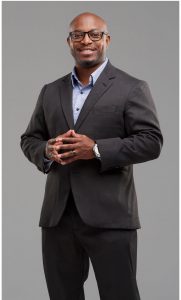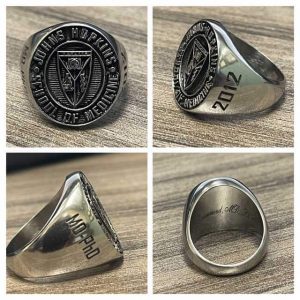Robert Drummond is passionate about creating a diverse and inclusive medical workforce. It’s why he mentors students in the Johns Hopkins Medical Scientist Training Program (MSTP), the School of Medicine’s combined MD-PhD program — the same one he graduated from in 2012.

Drummond has received several accolades, including the 2010 Johns Hopkins University Diversity Award and the 2022 Distinguished Medical Alumni Award by the Johns Hopkins Medical and Surgical Association. He also served on the medical school admissions committee for two years. Today, he and fellow MSTP alumnus Rory Goodwin, Med ’10 (MD/PhD), carry on a class ring tradition that they started as MSTP students.
Below Drummond shares why representation is crucial, his pride for Hopkins, and the next step in his career.
It’s important for individuals of all backgrounds to be a part of the workforce in order to best take care of the patient populace. The difference in care can lead to a delay in diagnosis.
Diversity is individuals. I think of ethnicity, but I also think of the number of women who are in science and medicine and why that’s important.
Individuals unconsciously carry bias with them. It’s the reality of our environment. It sets a certain baseline bias towards how we move about in daily society, and physicians are not immune. You can take that same emphasis in regards to caring for the LGBTQIA community. It’s why we need to have a diverse workforce of LGBTQIA members in medicine and research.
A person’s background is going to play a role in the types of questions asked as a scientist and clinician. I have had patients tell me, ‘I came to you because of what you look like.’
The first thing I tell prospective students is ‘I love Hopkins, but I care about your happiness.’
I tell them, go back to their schools of interest and ask about support. Do they have peer support? Do they have continuing medical education, to continue with their clinical skills while they’re in graduate programs? What happens in that transition, when they come back to med school and now have to compete with a super sharp, eager, third-year med student? Support leads to student success.

When I was a student at Hopkins, I thought, ‘We need to have something to continue to support the collegiality amongst the MD-PhD students in Hopkins.’ The MSTP crest on the ring means advancing science and medicine through investigation.
When students arrive at Hopkins, they receive the crest in the form of a lapel pin and can wear it on their white coats. I’ve been wearing mine for 10 years.
One of my new commitments, I will be furnishing every graduating class with class rings. Even if they don’t wear it, they can keep the ring as an heirloom. It’s a remembrance of what they accomplished.
The fireside chats started off with me gathering doctors I knew in different specialties, and I had them talk from their perspectives. It led to me continuing to talk and break down topics throughout the pandemic.
I was a science translator. I was doing exactly what the MD-PhD program is designed to do, to take things from the bench to the bedside — to take complicated matters and break them down in a way patients can understand treatments. It’s the most important thing I’ve ever done in my life. It made my Hopkins MD-PhD training worth it.
I’ve gone into business with a plastic surgeon. It’s a hair transplant business. I’m still using my background in inflammation in understanding about hair loss. I’m learning new things, new techniques. It’s been extremely rewarding.
Crown Hair Institute has been successful, and we have plans to grow. I’ve always wanted to have my own company. It gives me a better work-life balance compared to my previous role of being a medical director in urgent care. This will probably be my last chapter of my medical career. I’ve done academic medicine. I was in the National Guard where I was a battalion physician for six years. I’ve done urgent care, and now I’m in a new area — it’s been fun.
Topics: Alumni, Johns Hopkins Medicine, Students, School of Medicine, Support Scholars